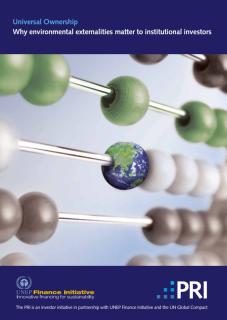
Environmental degradation that damages natural and human capital harms economic productivity. One way to measure business damage to the environment is to price natural resource use, waste and pollution. Damage costs from production are usually not paid in full by the companies generating them and are therefore known as “external costs” or “externalities”.
PRI and UNEP FI commissioned Trucost to calculate the current and future estimated monetary value of environmental degradation to provide a basis for large institutional investors, otherwise known as Universal Owners, to address externalities that have the greatest financial implications.
The report, Universal Ownership: Why environmental externalities matter to institutional investors, found that large institutional investors are, in effect, “Universal Owners”, as they often have highly-diversified and long-term portfolios that are representative of global capital markets. Their portfolios are inevitably exposed to growing and widespread costs from environmental damage caused by companies. They can positively influence the way business is conducted in order to reduce externalities and minimise their overall exposure to these costs. Long-term economic wellbeing and the interests of beneficiaries are at stake. Institutional investors can, and should, act collectively to reduce financial risk from environmental impacts.
